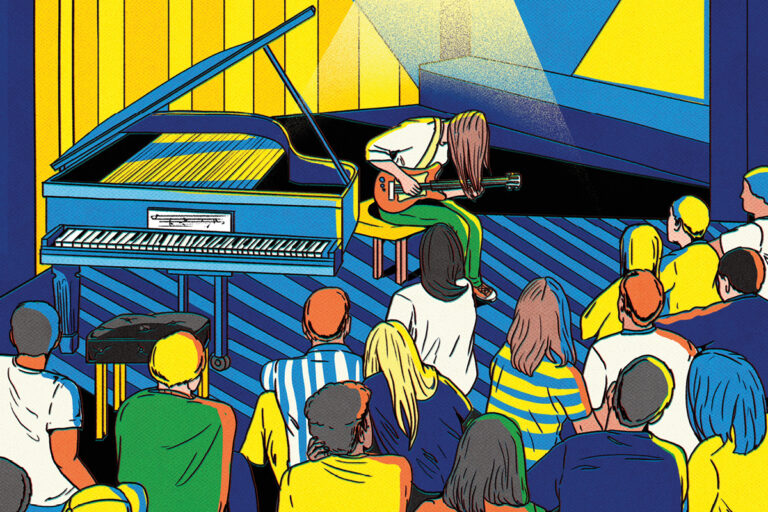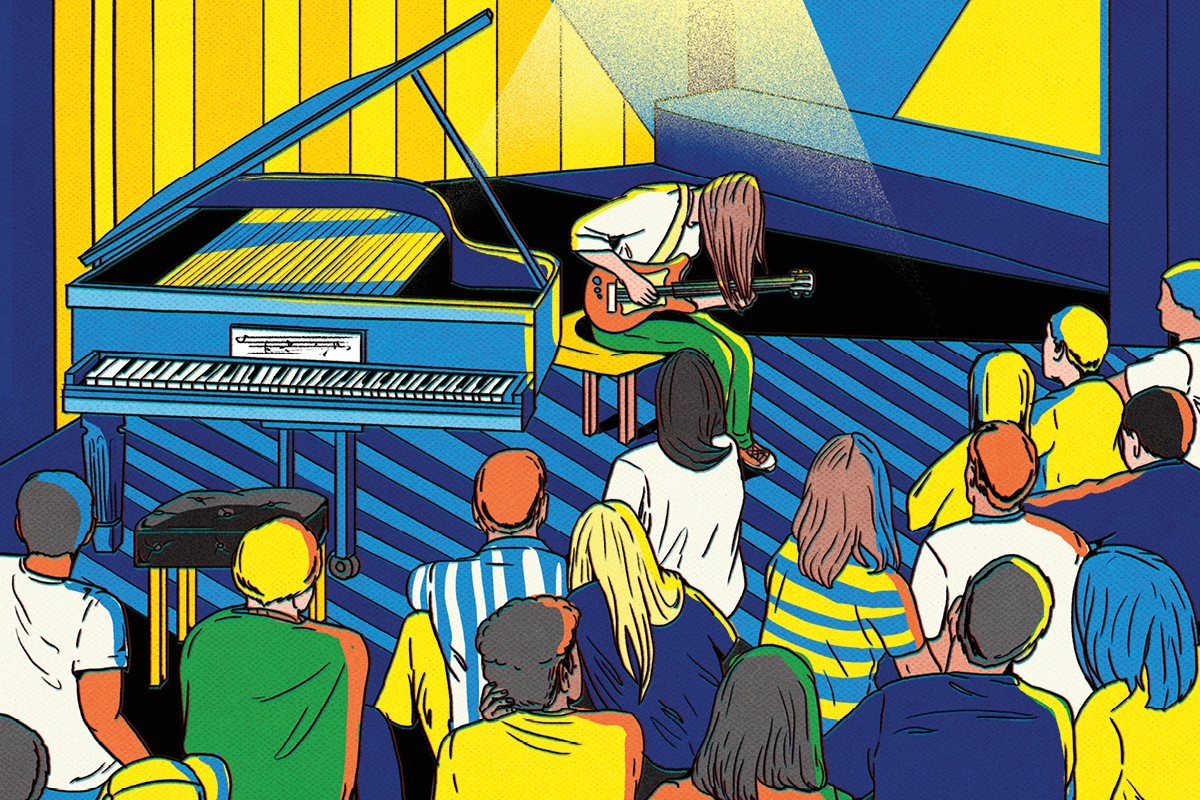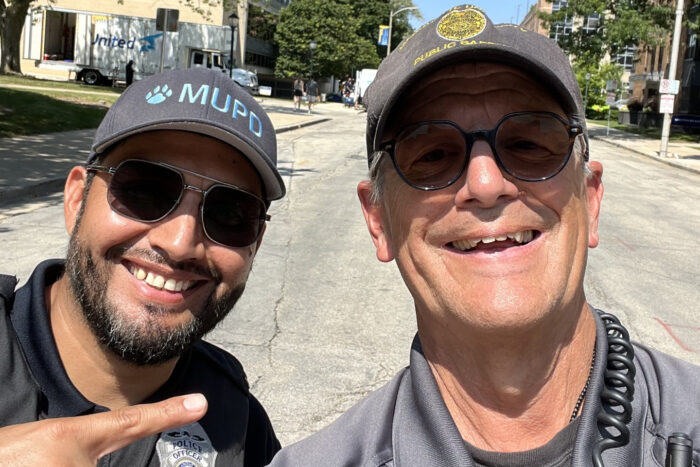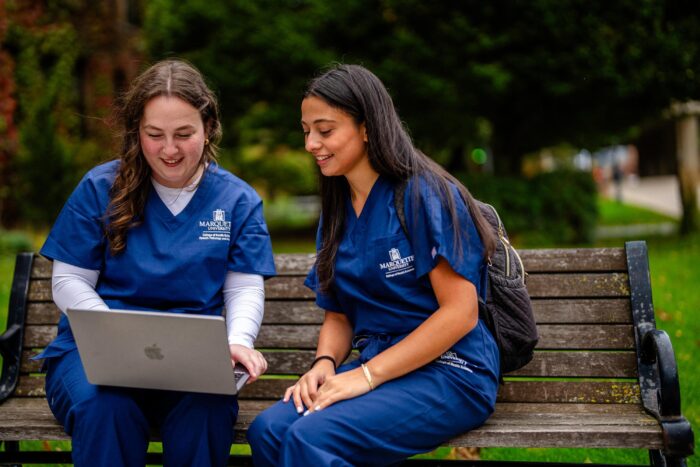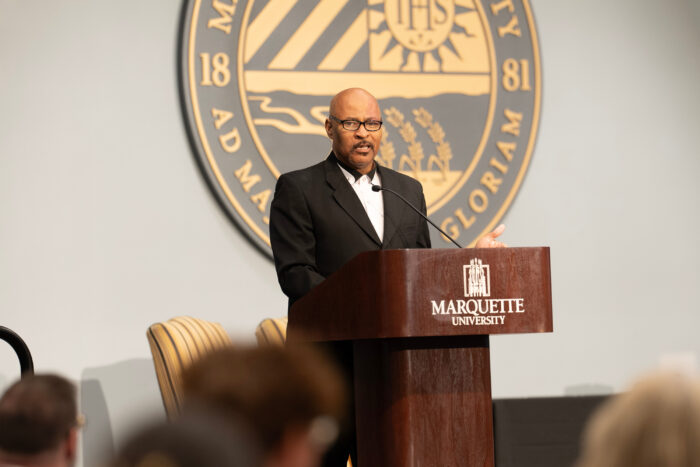Hands up for the heady days when students booked an array of future legends to play Marquette.
In November 1992, singer-songwriter Tori Amos was set to perform a sold-out show at the Weasler Auditorium. But there was a problem.
The piano the student sound team brought in for Amos’ show just wasn’t up to par. “Her tour manager came in, hit one key, and said, ‘She’s not playing tonight,’” recounts Lisa Moore, PT ’94.
At the time, Moore was head commissioner of the Marquette concert committee — a student-run organization that booked acts such as Amos to perform at venues around campus. From negotiating contracts to advertising shows to setting up the stage, students managed every part of these concerts from start to finish.
In some cases, they had to go the extra mile to make sure the show went on.
The day of Amos’ performance, Moore sent the sound crew on a frantic search for a better piano. One of the crew members knew someone at the Bradley Center, where Frank Sinatra was playing the same night. In a stroke of luck, there was a piano available — and the students were able to bring it to campus in time for the concert.
“It was a wonderful, wonderful show,” Moore recalls. Every seat in the Weasler was filled, so she watched the performance from the catwalk, alongside committee members including Michelle (Mahoney) Anthony, Arts’96, PT ’99, and Andy MacIntyre, Bus Ad ’95.
Future megastars like Radiohead and Pearl Jam…were in their infancy playing at venues like the Varsity Theatre. “You’d see them a year later on the cover of Rolling Stone,” Moore says.
“I remember looking down, watching Tori Amos playing piano and thinking, ‘I love this. This is where I’m supposed to be — helping out with concerts,’” Anthony says. “And everybody else [on the committee] was the same way.”
Anthony, who became head commissioner in 1995, describes the committee’s volunteers as “all major music nerds.” It was about more than just putting on concerts; the committee wanted to bring exciting, new acts to campus.
Many colleges and universities were then hosting one or two large concerts per year, usually rock acts that were at or past their peak. The Marquette committee set itself apart by booking newer and smaller acts more frequently — sometimes catching artists on their way to explosive fame.
Future megastars like Radiohead and Pearl Jam, which commissioners booked for just a few thousand dollars in the early 1990s, were in their infancy playing at venues like the Varsity Theatre. “You’d see them a year later on the cover of Rolling Stone,” Moore says.
But it wasn’t all rock ’n’ roll: Commissioners made sure to book acts that covered a broad range of genres to appeal to the broader student body. “That’s one of the things that I think we did well,” says Mike Swartz, Bus Ad ’95, who was head commissioner in 1994. “There were a lot of diverse styles of music that came to the university, and we tried to touch on as many different interests as we could.”
In the late 1980s and ’90s, genres such as grunge, alternative rock and hip-hop exploded in popularity. And being the music nerds they were, Marquette’s concert commissioners kept their ears open for artists who were causing a buzz.
“Back in the day, it was word of mouth and people sharing CDs,” Moore says. MTV was broadcasting music videos from hot new acts, and DJs were playing the latest hits on the radio. Finding music was more organic than it is today, she says.
In the late ’90s and beyond, the internet transformed how people discovered new bands and booked them. “The live entertainment space has evolved considerably since those days … specifically post-pandemic,” MacIntyre explains. Today, middle agents, boutique agencies and social media create a fragmented landscape that can be complicated to navigate.
Since graduating, MacIntyre has built a career as a talent procurement executive matching musical acts with corporate brands. And many other alumni on the concert committee continued working in music in some way after graduation. For example, Anthony toured as a musician for several years in bands and as a solo artist, and Moore was a music festival producer for many years, helping to put on events such as Bumber-shoot in Seattle. Swartz is a volunteer organizer of the Maha Music Festival in Omaha, Nebraska.
His time as commissioner helped him foster a love for music and make connections with people he still sees at concerts around Omaha today. “It was fun to be part of it,” Swartz says. “And there was a lot of camaraderie.”
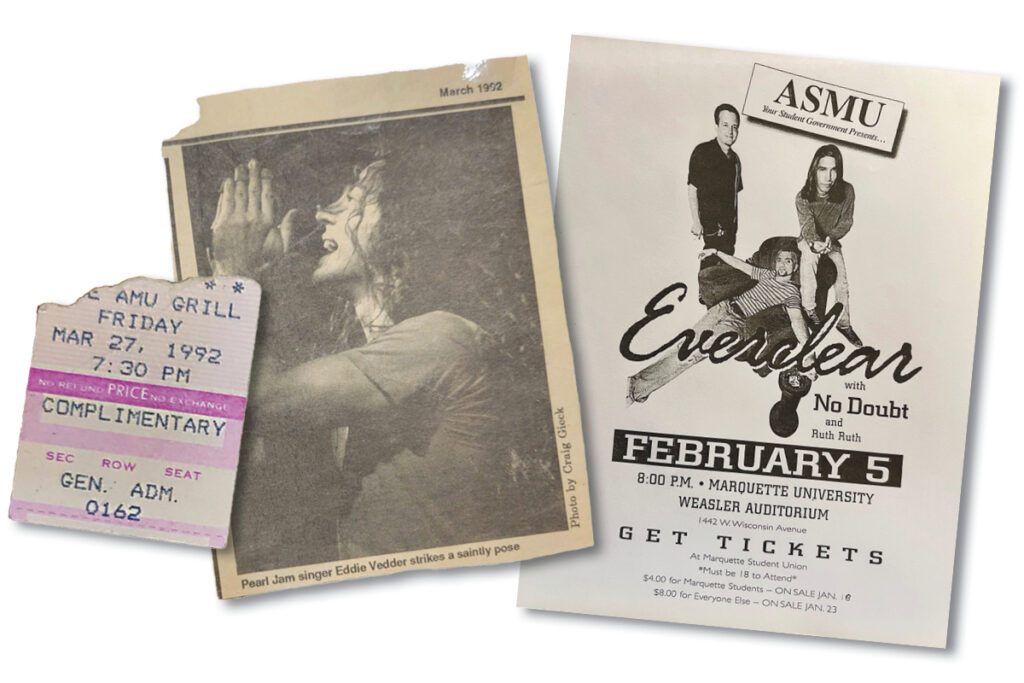
Four Unforgettable Shows
1992 – Pearl Jam/Eleven
The Varsity Theatre could barely contain the raucous energy of Pearl Jam’s sold-out show. When frontman Eddie Vedder began to climb up a light fixture mid-performance, “I was horrified,” says Swartz. “I set them up. And those things are not that stable.”
The seats in the Varsity were a point of contention for the band, which almost refused to play, since Pearl Jam rarely performed at venues with seats. Vedder warned amateur crowd-surfers to take caution, comparing the seats to a coral reef. All night, people jumped on stage and dove into the crowd as the band shredded through tracks from their 1991 album, Ten, which eventually went platinum 13 times over.
“They put on a hell of a show,” Moore says. “And then it was like, three minutes later, we would have never been able to afford them.”
1996 – Everclear/No Doubt
Touring as an opening act for the band Everclear, No Doubt left an impression on the concert committee both on and off stage. “I remember No Doubt, and Gwen Stefani in particular, just being so genuinely and sincerely friendly to all the Marquette concert committee members,” Anthony recalls. Band members signed CDs and even sat for an interview on MUTV.
On stage, their presence was electric. “If you were just alive and breathing, you could tell that that band was gonna be huge by the summer,” Anthony says. Sure enough, it was. The band continued its worldwide tour through 1996, and was nominated for two Grammys in 1997.
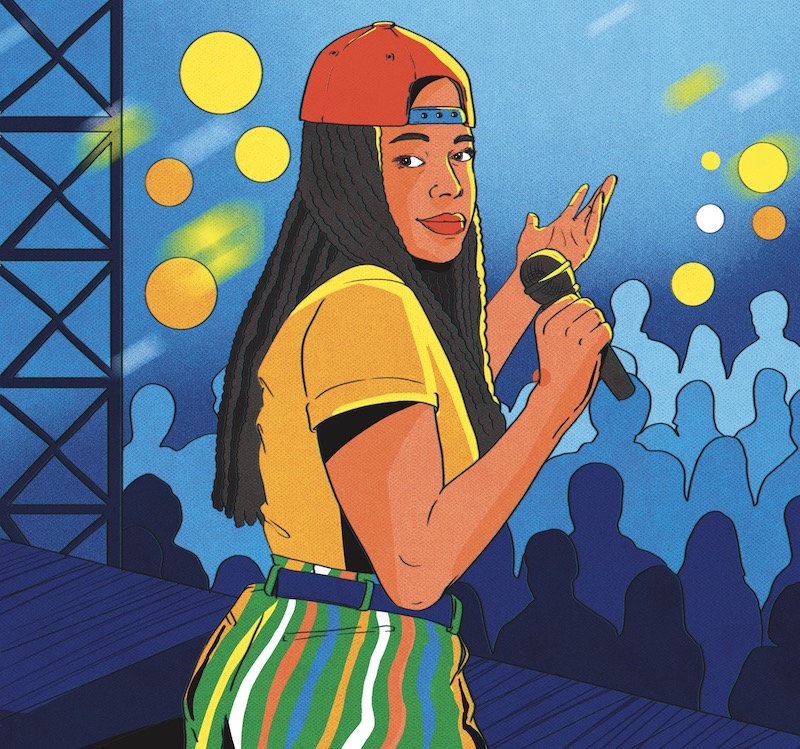
1992 – Yo-Yo
One of the most prominent female rappers to rise to fame in the ’90s, Yo-Yo drew a significant crowd to her performance at the Alumni Memorial Union Ballroom. Moore also booked several local hip-hop acts to open for her, including Kali Tribe, which was the first Milwaukee-area hip-hop group to appear on BET.
But when doors opened for the show, Yo-Yo was nowhere to be found. “She was downtown, shopping,” Moore says. Thankfully, the rapper arrived at the venue just in time to go on stage. Before she started her set, Moore helped Yo-Yo with a quick mic check. “She started rapping right when I was standing there, before she hit the stage,” Moore recalls. “That was actually kind of cool.”
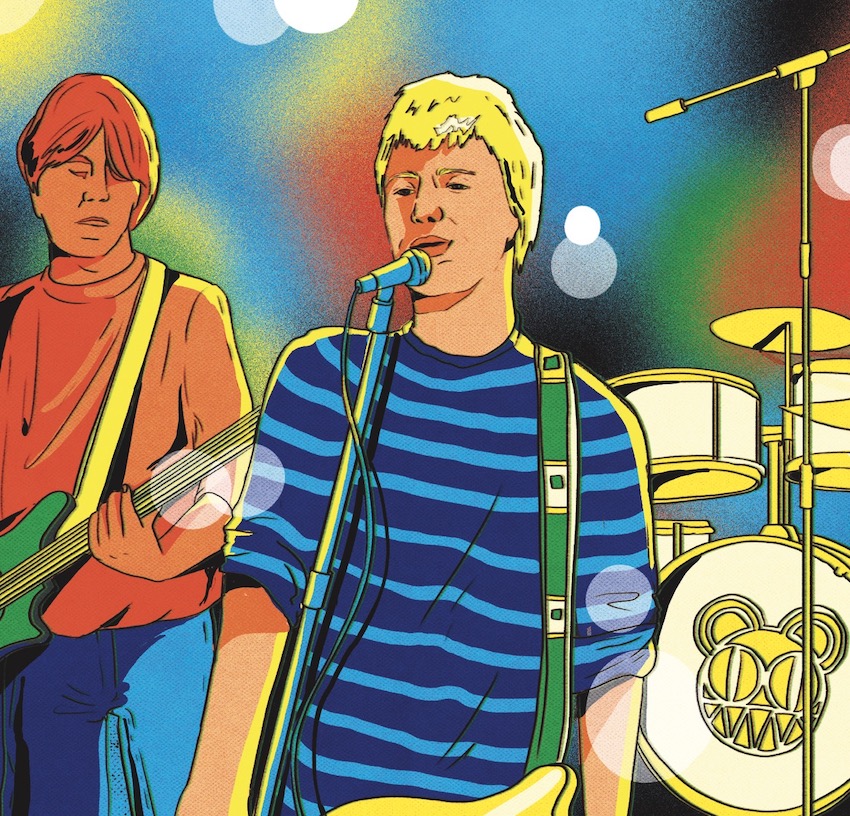
1993 – Radiohead/Belly
Following the release of their 1992 single Creep, English rock group Radiohead was picking up traction all around the globe. Their appearance at the Varsity Theatre drew a full house, complete with a few musical stars in the audience.
“When a band that had a lot of buzz around it would come, we would get calls from other bands asking if they could come to the show,” Swartz says. The Breeders, an alternative rock outfit that had played Marquette earlier in the year, asked for tickets. They sat in the balcony as VIPs, alongside agents and media professionals, watching the up-and-coming band wow the crowd.
“Radiohead was the biggest show, in my opinion, that we had at Marquette,” Anthony says. “That show was just over-the-top awesome. I will always remember it.”
Did you know?
Shows that never happened
It was pretty rare for bands to cancel their performances altogether. Nirvana was one act that got away, after the band dropped itself from its 1989 show opening for The Flaming Lips in the grill of the old Brooks Memorial Union. Commissioners paid just $150 to book the grunge group, but Kurt Cobain reportedly came down with a stomach illness and had to cancel.
Five years later, Swartz had his own disappointment when Paul Westerberg of the Replacements had to call off a performance on campus. “When we booked him, tickets sold out in 15 minutes,” Swartz recalls. “Within two days, we got word that he had slipped a disk in his back and we had to cancel the show. It was crushing.”
Illustrations by Maria Jesus Contreras
